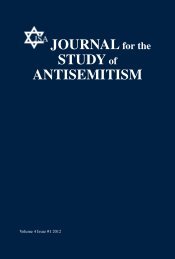JOURNALfor the STUDYof ANTISEMITISM
JOURNALfor the STUDYof ANTISEMITISM
JOURNALfor the STUDYof ANTISEMITISM
You also want an ePaper? Increase the reach of your titles
YUMPU automatically turns print PDFs into web optimized ePapers that Google loves.
Antisemitism in Brazil<br />
Alberto Milkewitz*<br />
Brazil, a nation with 190 million people, has grown in <strong>the</strong> last years to be<br />
an emerging global leader with influence and participation in key global<br />
issues. This article presents <strong>the</strong> current state of antisemitic affairs in that<br />
country.<br />
Key Words: Jews, Antisemitism, Brazil<br />
Sao Paulo is one of <strong>the</strong> three largest cities in <strong>the</strong> world, and <strong>the</strong> most<br />
populated of Brazil and South America. It is home to a very active Jewish<br />
community, comprising more than 60,000 people; <strong>the</strong> total size of <strong>the</strong> Jewish<br />
community in Brazil is estimated at 110,000. The country is a democracy,<br />
an open and free society with a stable currency, and is making a quiet<br />
and peaceful transition from <strong>the</strong> government of Luiz Inácio (Lula) da Silva<br />
to his successor, Mrs. Dilma Rousseff, who is from <strong>the</strong> same party, <strong>the</strong><br />
Partido dos Trabalhadores (PT)—<strong>the</strong> Workers Party.<br />
During <strong>the</strong> last eight years of Lula’s tenure, <strong>the</strong> Brazilian government<br />
looked for a place in <strong>the</strong> Security Council of <strong>the</strong> UN. Lula was very vocal<br />
in pursuing a special place for Brazil in <strong>the</strong> international community arena.<br />
In that regard, he tried to show that Brazil became a serious partner in <strong>the</strong><br />
discussion of international security issues—pointing out that Brazil helped<br />
Haiti and pursued a special role when <strong>the</strong> Portuguese-speaking African<br />
countries needed help. Lula’s foreign policy looked for an international role<br />
through placing dialogue as a top strategy to manage critical issues and<br />
disputes. That was <strong>the</strong> case in regard to Iran and to Venezuela. At <strong>the</strong> same<br />
time, to establish a balance with <strong>the</strong> Jewish community, Lula was first to<br />
sign for <strong>the</strong> creation of <strong>the</strong> UN International Holocaust Day. Lula is not<br />
considered an antisemite, but his party and <strong>the</strong>ir allies of <strong>the</strong> government<br />
coalition have adopted a permanently critical position against Israel. That is<br />
consistent with <strong>the</strong> traditional Brazilian anti-Israel vote in UN forums and<br />
committees. Itamaraty, <strong>the</strong> Brazilian Chancellery, systematically maintains<br />
a critical attitude to <strong>the</strong> Jewish state, even before President Lula’s tenure.<br />
In <strong>the</strong> past, <strong>the</strong> 1930s were a decade where <strong>the</strong> Integralists, <strong>the</strong> Brazilian<br />
fascists, generated in Brazil a climate of anti-Jewish hostility by creating<br />
<strong>the</strong> metaphor of <strong>the</strong> Jew who threatens Brazil and “equating Jews with<br />
157














